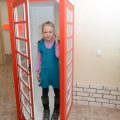 A photo: GettyIt is believed that children who speak two languages have a more flexible mindset, for example, they can come up with many ways to solve the same problem. This is not surprising, because they constantly have to choose between languages, and therefore, two different worldviews. The second language expands emotional intelligence, because the more words we use to identify feelings, the more we understand and differentiate the shades of our state, which means that we manage ourselves better. However, to bring up the only one in the family is not so easy. It is important to be consistent and adhere to a special bilingual learning system under any circumstances. As a result, either the baby will “see the light” and speak, or will not properly learn any language. How to inculcate a child's love of languages, tell teachers from English Preschool "Discovery".
A photo: GettyIt is believed that children who speak two languages have a more flexible mindset, for example, they can come up with many ways to solve the same problem. This is not surprising, because they constantly have to choose between languages, and therefore, two different worldviews. The second language expands emotional intelligence, because the more words we use to identify feelings, the more we understand and differentiate the shades of our state, which means that we manage ourselves better. However, to bring up the only one in the family is not so easy. It is important to be consistent and adhere to a special bilingual learning system under any circumstances. As a result, either the baby will “see the light” and speak, or will not properly learn any language. How to inculcate a child's love of languages, tell teachers from English Preschool "Discovery".
1. Limit the scope of the language
It is better to use a foreign language ina specific situation or a specific person. A small child gets confused if today his mother teaches him colors in Russian, and tomorrow in English. If the family speaks two languages, the rule "one language - one parent" is used. You can play specific games in a foreign language, or use it only at dinner, or only in the presence of grandma.
2. Less is more
You shouldn't constantly insert foreign words into your speech.words (especially for those parents who speak a foreign language poorly). Memorizing individual words will not teach you to speak, and pronunciation will be incorrect. Always remember that a child absorbs everything like a sponge, so if you make mistakes, he will repeat them too.
3. Learn to play
Learning a language for kids should be a game, notnot a lesson. It is important to intrigue the child so that he himself wants to learn something new. Children easily master anything when they are interested. Active games with the names of body parts and movements, songs and fairy tales-performances in English are much more effective than simply memorizing words.
4. Pull the conversation
It's better to concentrate on the wrong thingpronunciation, but on the free use of foreign words. Constant corrections create a psychological barrier, the child is afraid to make a mistake and does not speak at all. Children under 6 often pronounce the sounds of their native language incorrectly. It is important that teachers have correct pronunciation.
5. Language is not only words.
Learning a language is best accompanied by learningcultural features, traditions, holidays of another country, this enriches the process and builds an understanding of another environment for the child. For example, you can organize an English tea party or learn an English folk song or fairy tale.









